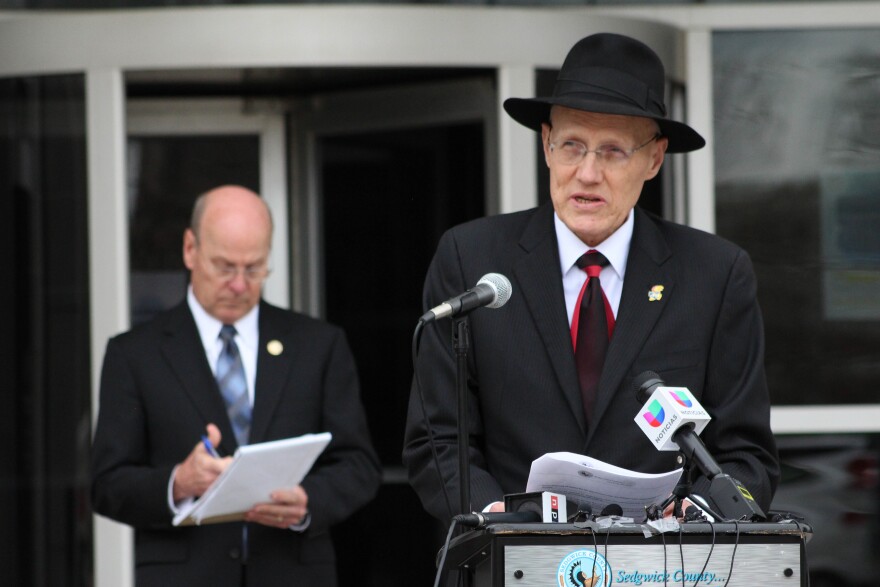Sedgwick County is leaving the next COVID-19 recovery steps up to businesses and residents.
County commissioners decided Wednesday not to impose any additional restrictions on how and when the local economy continues to reopen.
Instead, the county is recommending — but not requiring — that the guidelines outlined in the state’s phased reopening plan continue.
Gov. Laura Kelly’s “Ad Astra Plan” was introduced May 4 and abruptly ended Tuesday night less than a week into Phase 2. Kelly vetoed a bill that that would have restricted her powers to direct the state’s COVID-19 pandemic response, and turned authority over to leaders in the state’s 105 counties to decide what happens next.
"We need to trust our citizens," Commissioner Jim Howell said during Wednesday's meeting.
Under the governor’s plan, restaurants, retail stores and offices were allowed to open to the public beginning May 4, provided they maintained social distancing practices and limited groups to ten people or less.
Other businesses like hair salons, barbershops and tanning salons were allowed to reopen a week later under Phase 1.5 of the plan, but bars, night clubs, public swimming pools, outdoor and indoor large entertainment venues were among businesses restricted from opening until next month.
The county is encouraging businesses to continue to adhere to the state’s phases, but there won’t be enforcement.
"There’s nothing in here that says that if you don’t adhere to it, that you’re going to have the sheriff’s department or police department come and shut down your business," said Commissioner David Dennis.
The commission voted 3-2 to recommend following the existing state plan. Commissioners Howell and Michael O'Donnell were in favor of doing away with the phased approach.

Sedgwick Countys Health Officer Dr. Garold Minns told commissioners Wednesday the coronavirus might be in the community until 2021 or longer. He said social distancing is not a temporary strategy.
"I do not want something to happen where we're going to have to back up and go back to Phase 1 again," Minns said, "because I think that would be very traumatic for the community."
Commission Chairman Pete Meitzner agreed, noting that prevention measures like social distancing and using face masks are critical for suppressing the spread of the coronavirus.
"I think if we keep doing this, oh my gosh, it’s going to make protecting the health of our community and let us take more further steps and advance," he said.
The county also defined public gatherings as "persons commonly known to one another," and increased the limit on gatherings to 20, up from 15.
But this too is a recommendation, and there are no penalties for violations.
This isn’t the first county-by-county approach to containing the infectious disease: In March, a handful of Kansas counties imposed stay-at-home orders to help slow the spread of COVID-19.
Sedgwick County’s 30-day stay-at-home public health order took effect on March 25 less than a week after the first positive case of COVID-19 emerged in the county. Days later, Gov. Kelly issued a statewide stay-at-home order that superseded county rules. It lasted until May 4.
The shutdown was intended to slow the spread of the coronavirus through tighter restrictions on public activity and intense social distancing. County Health Officer Minns said the strategies were necessary to make headway against the disease, and ensure the local healthcare system did not become overwhelmed with COVID-19 patients.
The restrictions helped slow the virus spread, but they took an economic toll as businesses paused and employees were furloughed. The state’s unemployment rate for April shot up to 11.2 % after months of historically low levels hovering around 3%. The city of Wichita and Sedgwick County have the highest rates of unemployment in the state at nearly 20%.
More testing still needed
The Sedgwick County Health Department has about 110 people assigned to the county’s COVID-19 response to handle tasks like testing, contact tracing and community outreach.
The county has offered free coronavirus testing by appointment at its West Central location since March. In the beginning, the state health department had limitations on who could get tested. The county health department expanded eligibility in the last month as more test kits became available, but a person still must have COVID-19 symptoms.
As of Wednesday, more than 11,000 Sedgwick County residents have been tested. The state health department lists the county’s testing rate as 20.7 per 1,000 population, which is lower than other large Kansas counties.
The county plans to begin randomized testing in mid-June that will include asymptomatic people. Deputy County Manager Tim Kaufman says after the first baseline test, random sample testing will continue every two to three weeks to gauge the health of the community.
Sedgwick County is also developing a mobile coronavirus testing program to expand when and where people can get tested.
Beginning in June, the county health department will offer coronavirus testing in communities with low testing rates or areas where people have transportation issues.
People must have at least two COVID-19 symptoms to qualify for the county's free testing. As of last week, the county had more than 11,000 COVID-19 test kits available, with more on order.
Follow Deborah Shaar on Twitter @deborahshaar. To contact KMUW News or to send in a news tip, reach us at news@kmuw.org.





